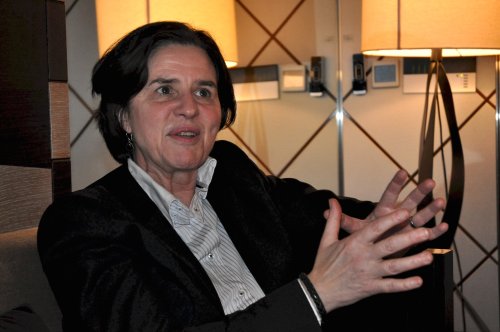Denmark, the first country to work on an aggressive plan to rid itself of dependence on fossil fuels, is looking towards Korea as one of the countries to bring its dream to fruition.
“We like to say that Denmark is a first mover; Korea looks like a fast mover and sometimes if you put a first and fast mover there some interesting things that come out of that synergy,” said the chairperson of the Danish Commission on Climate Change Dr. Katherine Richardson.
Last October the Danish Commission on Climate Change published their report about the Danish strategy to become fossil-free by the year 2050 making this European country the first to initiate a strategy where the entire country will be powered completely by renewable energy.
 |
Katherine Richardson, chairperson of the Danish Commission on Climate Change(Yoav Cerralbo/The Korea Herald) |
Richardson was in town last week to share the report’s findings with Korean government bodies, research institutes and private sector organizations and companies.
Among the gatherings was a meeting with the chairman of Global Green Growth Institute, former Prime Minister Han Seung-soo, with whom Denmark recently announced an official corporation agreement. She also met with Presidential Secretary on Green Growth Kim Sang-hyup at the Blue House.
“We don’t have a car industry but on the other hand, we are the first national system to use our infrastructure as a testing ground to test all these different energy pieces together,” she told The Korea Herald.
“Korea has some interesting toys and we have some interesting toys and we’re better at energy efficiency than Korea is and Korea can use that technology so I see a lot of possibilities for cooperation,” she added.
It is no secret that there is a finite supply of fossil fuels, the only question is when will this black gold run out. Denmark is less worried about that answer and more interested in finding ways to revamp its energy system without going broke.
Richardson’s Commission found that, at the macroeconomic level, there would not be a price difference if Denmark went green or stayed with fossil fuels over the next 40 years because of the increasing prices of fossil fuels.
To date, 20 percent of Denmark’s energy needs are covered with windmills.
Currently there are four frontrunners for the next wave to produce renewable energy: wind, solar, tidal and biomass.
Richardson believes that there should be a potpourri of technologies to fuel the needs of industry and everyday lives.
The other aspect that moves forward this “revolution” in Denmark is the country’s cooperation between the politicians, academics and industry.
“We have very good communication and cooperation which is also why I am in Korea, to convince Korea that we mean this in Denmark,” she said.
On the international stage, Richardson noted that while governments are slowly moving any concrete initiative forward at the multinational level, industry has taken over the reins to become the strong player by pushing the limits of technology and how it can better the lives of the world’s citizens.
By Yoav Cerralbo (
yoav@heraldcorp.com)








